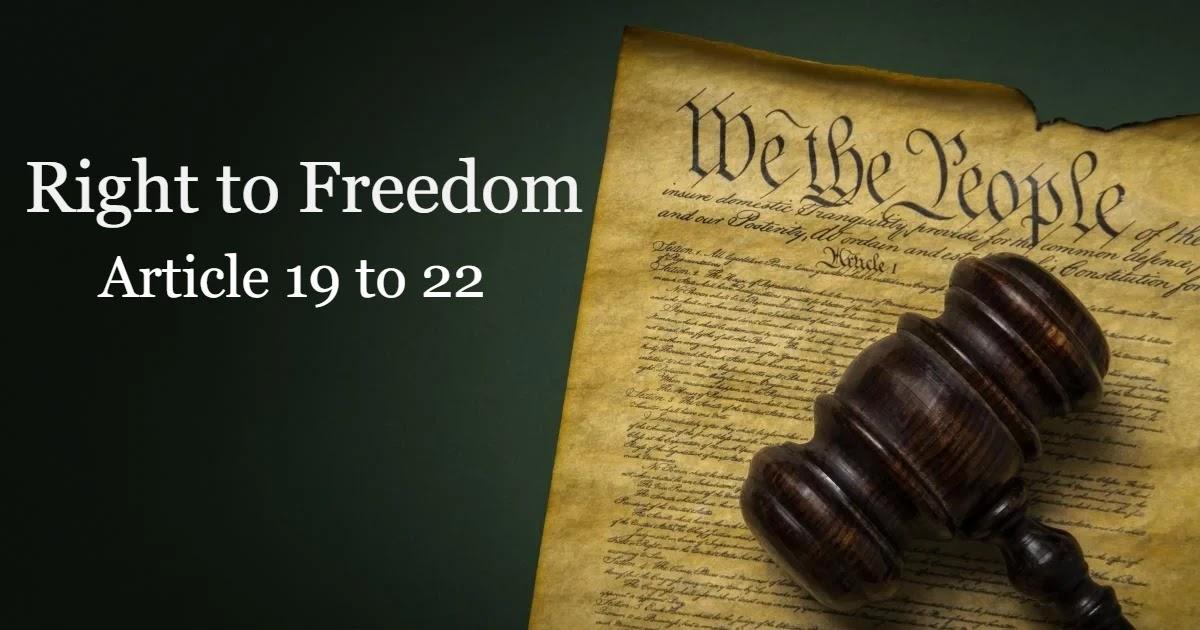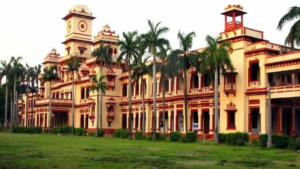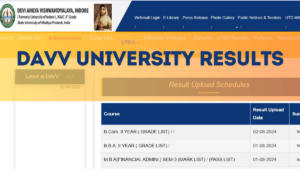Right To Freedom in India- Article 19-22
Right To Freedom is explained in Articles 19 to 22 of the Constitution covers the right to freedom, with the goal of ensuring individual rights that the framers of the Constitution deemed important, and these Articles also include specific constraints that the state may put on human liberty under certain conditions. Article 19 protects six democratic rights that are uniquely available to Indian citizens. Freedom of speech and expression, freedom of assembly without arms, freedom of association, freedom of movement throughout our country’s territory, freedom to dwell and settle in any area of India, and freedom to practise any profession are among them.
All of these liberties are subject to reasonable constraints imposed by the state, which are specified in Article 19 itself. National security, public order, decency and morality, contempt of court, incitement to offences, and defamation are among the reasons for imposing these limits, which vary depending on the right sought to be curtailed. The state also has the authority to nationalise any trade, industry, or service in the public good, to the exclusion of residents.
Read About Ports in India
Right to Freedom of Speech and Expression
Freedom of speech is a principle that protects an individual’s or a group’s right to express their thoughts and beliefs without fear of retaliation, censorship, or legal consequences. The Universal Declaration of Human Rights and international human rights law both recognize the right to freedom of expression as a human right. Free speech is protected by constitutional legislation in several countries. In political debate, terms like free speech, freedom of speech, and freedom of expression are used interchangeably. In a legal sense, however, freedom of expression refers to any activity that involves seeking, receiving, and transmitting information or ideas, independent of the media utilised.
Right to Freedom of Assembly
Individuals’ right or ability to gather together and collectively express, promote, seek, and defend their collective or shared beliefs is frequently referred to as “freedom of peaceful assembly” or “freedom of association.” The right to freedom of association has been recognised as a human right, a political right, and a civil liberty.
Read About RNA
Right to Freedom of Religion Association
The right of an individual to join or quit groups voluntarily, the right of a group to take collective action to further the interests of its members, and the right of an association to accept or deny membership based on specified conditions all fall under the umbrella of freedom of association. It is defined as a person’s right to join with other people to jointly express, promote, seek, and/or defend common interests.
All modern and democratic legal systems recognize right to freedom religion of association as both an individual and a communal right.
Right to Freedom of Movement
Freedom of movement, often known as mobility rights or the freedom to travel, is a human rights concept that encompasses the right of persons to travel from one location to another within a country’s territory, as well as the right to leave and return to that country. The right encompasses not only visiting places, but also relocating one’s residence or place of employment.
Picture of Right to Freedom

“Right to Freedom” is a fundamental human right that is recognized and protected in various legal and political frameworks around the world. It encompasses a range of freedoms and liberties that individuals are entitled to enjoy without unwarranted interference from the government or other individuals. While the specific rights and their scope may vary from one country to another, some common elements of the Right to Freedom include:
- Freedom of Speech and Expression: This right allows individuals to express their opinions, ideas, and beliefs freely, whether through spoken or written words, art, or other forms of communication. It also includes the right to seek and receive information.
- Freedom of Religion: Individuals have the right to practice their religion of choice, or to not practice any religion at all, without discrimination or persecution. This includes the freedom to worship, assemble with others for religious purposes, and express one’s religious beliefs.
- Freedom of Assembly and Association: People have the right to peacefully assemble and associate with others for various purposes, such as political, social, or cultural activities. This right allows for the formation of organizations, political parties, and advocacy groups.
- Freedom of the Press: This right ensures that media organizations can operate independently and report on events and issues without censorship or government interference. A free press is considered crucial for a functioning democracy.
- Freedom of Movement: Individuals have the right to move within their own country and to leave and enter it freely, subject to certain limitations for reasons such as national security and public safety.
- Freedom from Arbitrary Detention: People should not be subjected to arbitrary arrest or detention. Law enforcement agencies must follow due process and legal procedures when detaining individuals.
- Right to Privacy: This right protects individuals from unwarranted intrusion into their private lives, including their homes, communications, and personal data.
- Right to a Fair Trial: This includes the right to a fair and public hearing by an impartial tribunal, the presumption of innocence until proven guilty, and the right to legal representation.
- Freedom from Torture and Inhuman or Degrading Treatment: Individuals have the right to be free from physical or psychological torture, cruel, inhuman, or degrading treatment or punishment.
- Equality Before the Law: All individuals are equal before the law and are entitled to equal protection and benefit of the law without discrimination on grounds such as race, religion, gender, or other characteristics.
These freedoms are often enshrined in national constitutions and are also protected by international human rights treaties and agreements, such as the Universal Declaration of Human Rights and the International Covenant on Civil and Political Rights. It’s important to note that these rights are not absolute and can be subject to limitations in certain circumstances, such as to protect national security, public order, or the rights and freedoms of others. Balancing individual freedoms with the needs of society is an ongoing challenge for governments and legal systems worldwide.









 CUET BHU Cut off 2025: Course-wise and C...
CUET BHU Cut off 2025: Course-wise and C...
 DAVV Result 2025 Out, Download Devi Ahi...
DAVV Result 2025 Out, Download Devi Ahi...
 Calicut University Timetable 2025 PDF Re...
Calicut University Timetable 2025 PDF Re...










